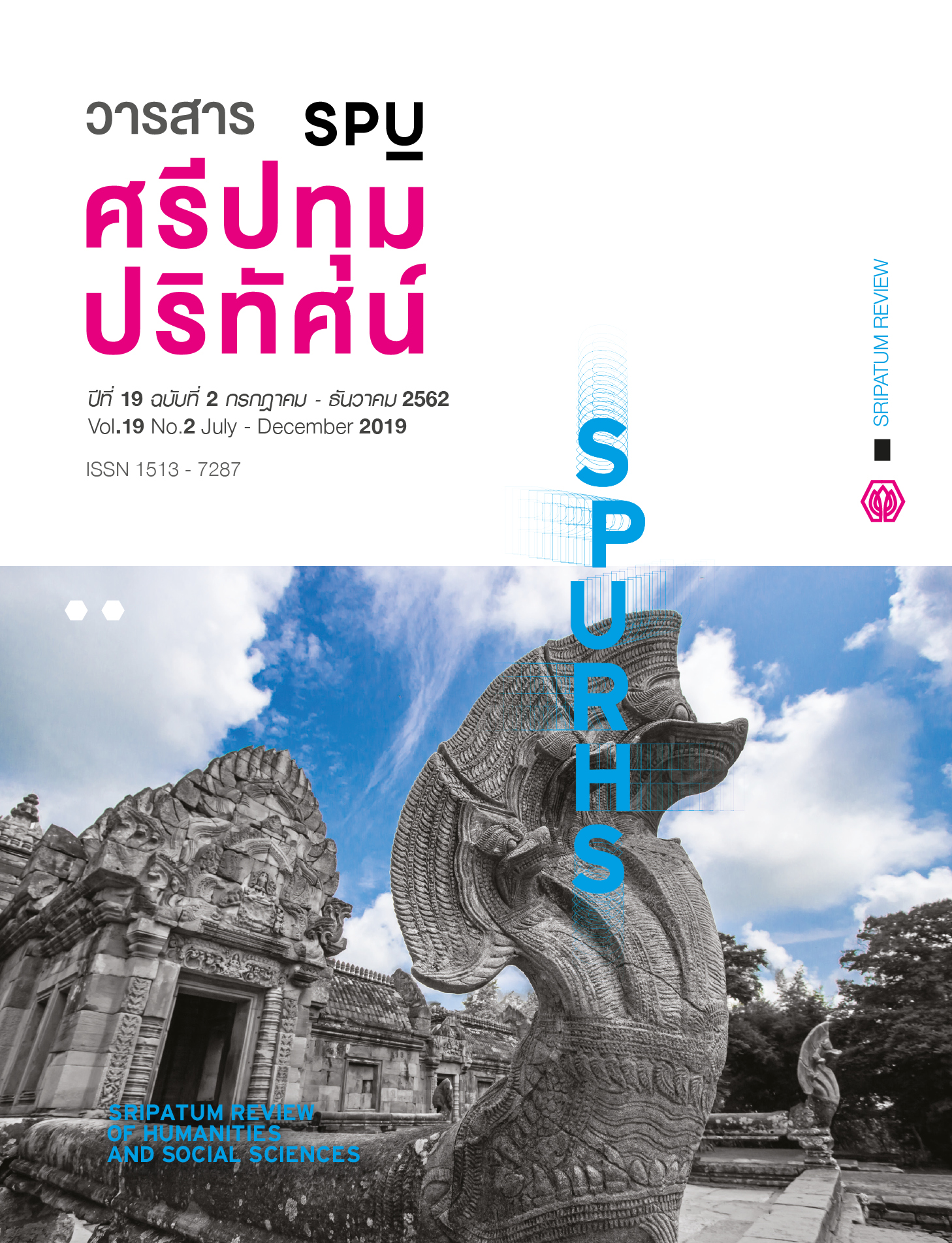การพัฒนาตัวบ่งชี้ความเป็นพลเมืองดีของผู้บริหารสถานศึกษา (A Development of Good Citizenship Indicators of School Administrators)
Main Article Content
Abstract
The objectives of this study were (1) to create and develop good citizenship
indicators of school administrators, and (2) to examine the congruence of the model of good citizenship indicators of school administrators developed by the researcher with empirical data. The researcher studied related documents and research reports; then synthesized the contents of the documents to determine the components and indicators. After that, 7 experts were interviewed to validate the appropriateness of the components and indicators. Also, a questionnaire was used to collect data from 478 school administrators in order to verify construct validity of the model. The data were analyzed using basic statistics and confirmatory factor analysis via the AMOS Program. The study found that
1. The good citizenship indicators of school administrators consisted of 13 indicators from 3 components. (1) The component of participation as a good citizen, which consisted of 4 indicators: the realization of and seeing value of conservation and development of natural resources and the environment; the systematic analytical thinking; the team working; and the change literacy. (2) The component of social justice awareness, which consisted of 4 indicators: the possession of ethics and virtues; the self-respect and respect for others; the respect for equality and peaceful conflict management. (3) The component of self-responsibility, which consisted of 5 indicators: patriotism; the possession of skills and knowledge in life management; the respect for the law and compliance with social rules and regulations; the adherence to specific value and ideology; and the political identity.
2. The model of good citizenship indicators of school administrators had goodness-of-fit significantly with the empirical data; with statistical values of =43.29, =39, =1.11, =0.29, =0.99, =0.97, =0.02.
Article Details
1. กองบรรณาธิการสงวนสิทธิ์ในการพิจารณาและตัดสินการตีพิมพ์บทความในวารสาร
2. บทความทุกเรื่องจะได้รับการตรวจสอบทางวิชาการโดยผู้ทรงคุณวุฒิ แต่ข้อความและเนื้อหาในบทความที่ตีพิมพ์เป็นความรับผิดชอบของผู้เขียนแต่เพียงผู้เดียว มิใช่ความคิดเห็นและความรับผิดชอบของมหาวิทยาลัยศรีปทุม
3. การคัดลอกอ้างอิงต้องดำเนินการตามการปฏิบัติในหมู่นักวิชาการโดยทั่วไป และสอดคล้องกับกฎหมายที่เกี่ยวข้อง
References
Bebiroglu, B., Geldhof, G. J., Pinderhughes, E., Phelps, E.,& Lerner, R. M. (2013). From Family to Society: The Role of Perceived Parenting Behaviors in Promoting Youth Civic Engagement. Parenting, 13(3), 153-168.
Bobek, D., Zaff, J., Li, Y., & Lerner, R. M. (2009). Cognitive, emotional, and behavioral components of civic action: Towards an integrated measure of civic engagement. Journal of Applied Development Psychology, 30, 615-627.
Chinwanno, W. (2003). Professional Ethics. Bangkok: Chuan Pim. (in Thai)
Cogan, J. & Derricott, R. (1998). Citizenship for the 21st Century. An International Perspective on Education. London: Kogan Page.
Davies Ian, Gregory, & Riley Shirley, C. (1999). Good Citizenship and Educational Provision. New York: Graland.
Hair, J. F., Black, W. C., Babin, B. J., & Anderson, R. E. (2010). Multivariate Data Analysis: A Global Perspective. 7th Edition, Pearson Education, Upper Saddle River.
Kahne, Joseph, & Westheimer, J. (2004), Summer. What Kind of citizen? The politics of educating for democracy. American Educational Research Journal, 41(2), 237- 269.
Khongcharœn, M. (2012). Elements for enhancing consciousness of citizenship in a way of life democracy. Secretariat of the House of Representatives. (in Thai)
National Education Act (No. 3). (2010, 22 July). Government Gazette. Volume 127 Episode At 45 A, page 1-3. (in Thai)
Nirunthavee, S. (2005). Learning management to develop learners to be good citizens.Bangkok: Office of the Education Council. (in Thai)
Office of the National Education Commission. (2002). Guidelines for quality assessment in accordance with basic education standards For internal quality assurance of educational institutions. Bangkok: National Buddhism Office. (in Thai)
Ralph, C.P. (1958). Teaching Social Studies in Elementary School. New York: Holt, Rinehart and Winston.
Rodsaen, A. (2014). Development of a model for organizing learning activities together to enhance citizenship teaching ability for basic education teachers. Doctor of Education thesis. Naresuan University. (in Thai)
Smith, A. (2005). Civic and Citizenship Education in contest divided societies. University of Ulster Ireland: Unesco Chair.
SongkitSap S. (2007). Ethics and human resource management. Sripatum Review of Humanities and Social Sciences, 7 (2), 114-121. (in Thai)
Subcommittee on Educational Policy and Reform in the Second Decade on Educational Development to Create good citizen. (2010). Education Development Strategies for Citizenship Development, 2010-2018. Bangkok: Ministry of Education. (in Thai)
Tantisunthorn, T. (2012). citizenship Education. Bangkok: Institute of Educational Policy. (in Thai)
The Teachers Council of Thailand regulations regarding professional ethics, 2013. (2013, 4 October). Government Gazette. Volume 130 Special Episode 130 D, page 72-74. (in Thai)
Thewanarumitkun, P. (2012). Civic Education. Bangkok: Health Promotion Foundation. (in Thai)
Wanitbancha , K. ( 2014 ). Structural Equation Modeling (SEM) with AMOS. 2 nd ed. Bangkok: Samlada. (in Thai)
Zaff, J., Boyd, M., Li, Y., Lerner, J. V., & Lerner, R. M. (2010). Active and Engaged Citizenship: Multi-group and Longitudinal Factorial Analysis of an Integrated Construct of Civic Engagement. Journal of Youth and Adolescence, 39, 736-750.


